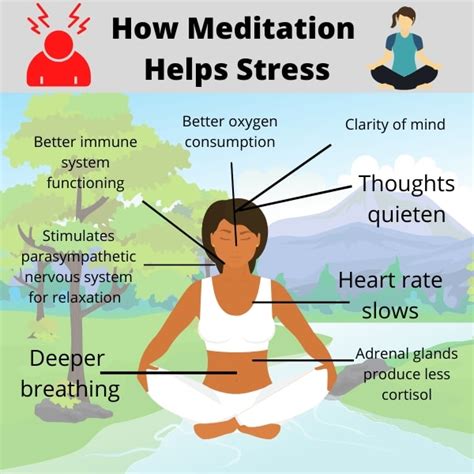The Role of Meditation in Reducing Stress and Improving Focus

In today's fast-paced world, stress has become a ubiquitous challenge. From demanding jobs to personal responsibilities, the modern lifestyle often leaves us feeling overwhelmed, distracted, and mentally fatigued. Alongside stress, many people also struggle with maintaining focus and concentration, which can negatively impact productivity and overall well-being. One powerful tool that has gained increasing attention for its ability to address both of these issues is meditation.
Meditation, a practice that dates back thousands of years, has been shown to offer numerous benefits for mental and emotional health. It is widely recognized as an effective method for reducing stress and improving focus. But how exactly does it work, and why is it so beneficial?
Meditation and Stress Reduction
Stress is a natural response to challenges, but chronic stress can have harmful effects on both the body and the mind. When we experience stress, our bodies release hormones like cortisol and adrenaline, which trigger the "fight or flight" response. While this response is helpful in short bursts, prolonged activation can lead to negative outcomes such as anxiety, depression, high blood pressure, and weakened immune function.
Meditation helps counteract this stress response by activating the parasympathetic nervous system, often referred to as the "rest and digest" system. This system is responsible for calming the body after a stress response, helping to lower heart rate, reduce blood pressure, and promote relaxation. By regularly practicing meditation, individuals can train their bodies to respond more calmly to stressors, preventing the physiological effects of chronic stress from taking hold.
There are various meditation techniques that can be particularly effective in reducing stress. Mindfulness meditation, for example, encourages individuals to pay attention to the present moment without judgment, fostering a sense of calm and awareness. This practice helps break the cycle of rumination and worry, which are often central to feelings of stress. Studies have shown that mindfulness meditation can reduce cortisol levels, decrease symptoms of anxiety, and improve overall emotional regulation.
Meditation and Focus Enhancement
In addition to its stress-relieving benefits, meditation is also a powerful tool for improving focus and mental clarity. In our modern world, distractions are abundant—whether it's the constant ping of notifications, multitasking, or an overabundance of information. The result is often a scattered mind that struggles to stay on task.
Meditation cultivates the ability to focus by training the mind to concentrate on a single object, thought, or sensation. In many forms of meditation, such as concentration meditation or breath-focused meditation, practitioners focus their attention on the breath or a specific mantra. This process of refocusing the mind when it wanders helps strengthen mental discipline and improve the brain's ability to sustain attention over time.
Neuroscientific research has shown that regular meditation can lead to changes in brain structure and function that enhance cognitive abilities like focus and memory. For example, studies using brain imaging techniques have found that long-term meditators have increased gray matter density in areas of the brain associated with attention, decision-making, and emotional regulation. This suggests that meditation doesn't just help in the short term, but it can also lead to lasting improvements in mental functioning.
One of the key benefits of meditation for focus is its ability to reduce mental clutter. By training the mind to be more present and less reactive to distractions, meditation creates space for clearer thinking and more efficient mental processing. As a result, individuals who meditate regularly may find that they are able to stay on task for longer periods of time, complete work more efficiently, and feel more mentally sharp throughout the day.
The Science Behind Meditation's Effectiveness
Numerous studies have explored the effects of meditation on stress and focus, providing scientific backing for its effectiveness. Research published in journals like Psychological Science and The Journal of Neuroscience has found that meditation can have a profound impact on the brain and body.
For example, a study published in Psychological Science found that participants who practiced mindfulness meditation for just a few weeks showed significant improvements in attention and cognitive flexibility. Another study in The Journal of Neuroscience demonstrated that long-term meditation could increase the thickness of the prefrontal cortex, a region of the brain associated with higher-order cognitive functions like decision-making and attention regulation.
Additionally, meditation has been shown to decrease activity in the default mode network (DMN), which is the part of the brain that is most active when we are daydreaming or not focusing on a task. High DMN activity is associated with distractions and mind-wandering, both of which can impede focus. By reducing this activity, meditation can help individuals stay more present and focused on the task at hand.
Practical Tips for Incorporating Meditation into Daily Life
For those new to meditation or looking to deepen their practice, here are a few practical tips:
-
Start Small: If you're just beginning, start with just 5-10 minutes of meditation per day. Over time, you can gradually increase the duration as you become more comfortable with the practice.
-
Choose a Comfortable Space: Find a quiet, comfortable place where you won't be disturbed. This could be a corner of your home, a park, or even your office.
-
Focus on Your Breath: A simple and effective way to meditate is by focusing on your breath. Close your eyes and take slow, deep breaths, paying attention to the sensation of air entering and leaving your body. If your mind wanders, gently bring your attention back to your breath.
-
Practice Mindfulness Throughout the Day: You don't need to set aside a specific time for meditation in order to benefit from it. You can practice mindfulness throughout the day by bringing your attention to the present moment, whether you're eating, walking, or working.
-
Be Patient: Like any skill, meditation takes time and practice. Don't be discouraged if you find it difficult at first—simply return to your practice and trust that the benefits will come with consistency.